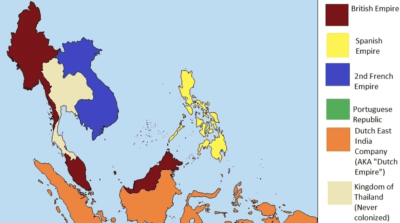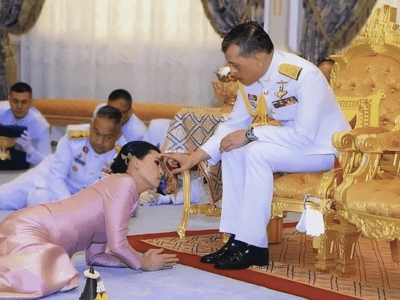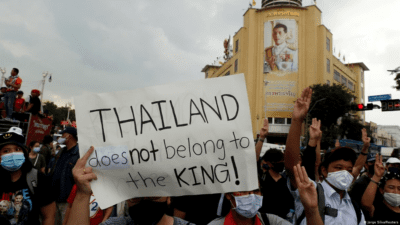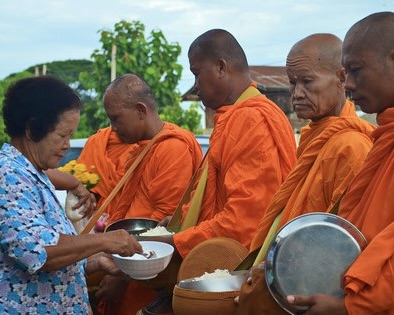By Josh Butterworth. Josh is Impact Teaching’s Thailand Program Coordinator, and he lives in Thailand.
Whether you prefer late night scrolling on TikTok, watching Youtubers devour delicious street food, or marveling at nature documentaries on the BBC – it’s difficult not to develop an idea of what you think Thailand is like from a distance.
It’s all pristine beaches, flaming woks and jungles bursting wildlife – right?
Well, yes! But that’s just one small part of it, there’s so much more to this wonderful country than that. In this article, we hope to shed a bit more light on the Land of Smiles, with a few interesting facts that might make you think again about what this special place is really all about.
Thailand remains unconquered
 While Europeans sailed the world, bringing with them tyranny and cruelty as they went, the abundance of resourses and exotic treasures found across Southeast Asia were prime targets for the empire makers. From Myanmar in the west to the Philippines in the east – all was controlled by foreign hands, but one. The Kingdom of Thailand never succumbed to the colonialization that was spreading across its neighbors like a deadly wildfire. But why?
While Europeans sailed the world, bringing with them tyranny and cruelty as they went, the abundance of resourses and exotic treasures found across Southeast Asia were prime targets for the empire makers. From Myanmar in the west to the Philippines in the east – all was controlled by foreign hands, but one. The Kingdom of Thailand never succumbed to the colonialization that was spreading across its neighbors like a deadly wildfire. But why?
Longstanding enemies, the British and the French, found themselves competing over the continent. The British controlled Myanmar to the west, and Malaysia to the south – whereas the French occupied Vietnam, as well as parts of what we now know as Laos and Cambodia, to the east. The Kingdom of Siam, now Thailand, sat between the two competing powers, and acted as somewhat of a buffer zone to maintain the peace. But this alone was not the reason why Thailand managed to maintain its resistance of foreign control.
It was also thanks to the adaptability and savviness of the Thai leadership that this proud nation was able to remain so. They modernized and transformed their political system into a more European style, this worked well to appease the surrounding powers who looked fondly upon the change. To the European colonizers who held maps in high regard, undefined borders were like an open invitation to move in, this prompted Thai leadership to hire top cartographers to define their borders and make it clear to the Europeans what was and was not theirs. A more centralized and refined power grew with the introduction of a professional standing army that was used to control local rulers and strengthen government. And on top of everything else, the royal family adopted more Western style way of life – this included clothing, imports such as cars, and even sending their sons to Europe for a Western education.
The influence of this fascinating history can still be seen to this day. Thailand is a proud country, its people are strong and resilient, but there remains an openness to accepting others and their way of life – whilst also being able to stay loyal to its own core values and beliefs. Just as the leaders of the country did back in the times of colonization, Thailand today is able to work with other countries for the benefit of them both. Whether in business or tourism, there is a sense that Thailand can shift and morph into whatever it wants to be in order to succeed. This is a unique and effective ability, and is arguably why Thailand in 2024 sits at the table with the big boys as one of the powerhouses in the region.
The Thai royal family is the richest in the world
 When you think of royalty, the British monarchy or an Arab sheik may spring to mind. But in fact, it is the royal family of Thailand that you should be thinking of, their power and wealth is unrivalled by any other around the world. With a net worth of 43 billion dollars, a number that’s almost impossible to comprehend, the King of Thailand could afford to feed all of the worlds hungry people for one whole year – with enough left in the bank to live a life of complete luxury for at least a few more centuries. But just how did they get so rich?
When you think of royalty, the British monarchy or an Arab sheik may spring to mind. But in fact, it is the royal family of Thailand that you should be thinking of, their power and wealth is unrivalled by any other around the world. With a net worth of 43 billion dollars, a number that’s almost impossible to comprehend, the King of Thailand could afford to feed all of the worlds hungry people for one whole year – with enough left in the bank to live a life of complete luxury for at least a few more centuries. But just how did they get so rich?
After the death of his father in 2016, Maha Vajiralongkorn became the tenth King of Thailand, as well as one of the richest men on earth. But it was not through his hard work that this great wealth was created, years of fantastic business and Thailand’s numerous natural recourses is what turned their royal family into the richest around. More than a 20% stake in one of the country’s biggest banks, owning a third of Thailand’s largest cement company, and real estate worth more than 30 billion dollars are the main sources of this breathtaking wealth, and don’t forget all that taxpayer money too. But in a country where many cannot even afford the bare minimum, resentment and division was surely inevitable.
Among many in Thailand, especially the older generations, the royal family is still incredibly important. Their influence is clear the second you arrive in Suvarnabhumi Airport, with large pictures of the king towering above you as you go through passport control. This continues along the highway and in towns throughout the country. The kings face can be seen in every classroom as well as some shops, restaurants and even in many people’s homes. The lèse-majesté law, which has been in place since 1908, means that it is illegal to defame, insult or threaten the royal family – you can even face up to 15-years of prison time for stepping on Thai money. The feet are judged to be the dirtiest part of the body in Thailand, so stepping on money is deemed as disrespectful of the monarchy whose faces can be found on all Thai currency. But their power is not simply based on fear and the enforcement of law, many people respect and hold them in such high regard because of the supposed stability they bring to the country. They are seen as a symbol of the strength, and the Thai people are taught to respect them from a young age. However, this doesn’t always go to plan.
 As the world saw in the large riots of 2020 and 2021, across Thailand but mainly in Bangkok – there is a significant portion of the Thai population who do not share the same love and admiration of their royal family as others. The protests were started by a small group of students who opposed the Thai political system and sought a reform of the monarchy. It turns out they were not alone in feeling this way. Tens of thousands of people took to the streets to support the cause and a ‘state of emergency’ was called in Bangkok during October of 2020. In the end – the protests were unsuccessful. But it is evidence of the growing discontent for the monarchy and political system in a country where young people are struggling, the gap between rich and poor is growing, many families are living in poverty and people are expected to work long hours for six or seven days of the week. All of this is going on while their king spends most of his time in Germany, is reported to have up to twenty mistresses and enough money to solve the financial problems of all his less fortunate citizens for decades. The divide among Thais on their feelings towards the monarchy is often, but not always, influenced by age. However, regardless of anyone’s opinion, noting is likely to change for the richest and arguably most powerful monarch on earth any time soon.
As the world saw in the large riots of 2020 and 2021, across Thailand but mainly in Bangkok – there is a significant portion of the Thai population who do not share the same love and admiration of their royal family as others. The protests were started by a small group of students who opposed the Thai political system and sought a reform of the monarchy. It turns out they were not alone in feeling this way. Tens of thousands of people took to the streets to support the cause and a ‘state of emergency’ was called in Bangkok during October of 2020. In the end – the protests were unsuccessful. But it is evidence of the growing discontent for the monarchy and political system in a country where young people are struggling, the gap between rich and poor is growing, many families are living in poverty and people are expected to work long hours for six or seven days of the week. All of this is going on while their king spends most of his time in Germany, is reported to have up to twenty mistresses and enough money to solve the financial problems of all his less fortunate citizens for decades. The divide among Thais on their feelings towards the monarchy is often, but not always, influenced by age. However, regardless of anyone’s opinion, noting is likely to change for the richest and arguably most powerful monarch on earth any time soon.
Over 90% of Thais are Buddhist
While the monarchy may divide the people of Thailand – religion is something that brings them together. Buddhism arrived in the country as early as the 3rd century BC, around 4,000 years before the birth of Christianity. The roots of the religion are deep and strong, and still influence people’s daily lives in a significant way to this day. Although just over a fifth of the population is Muslim and an even smaller number are Christian – it is the more than 30,000 Buddhist temples that dominate the country and guide the majority of its people. Down-to-earth living, hard work, perseverance and sacrifice are the core values that the religion promotes. But it needs more than that – with a suspected value of over one billion dollars, Buddhism in Thailand is big business, and financial sacrifice is the name of the game.
The great riches of Thailand’s number one religion are mostly thanks to the sheer number of people in the country that follow it, a far bigger proportion of the population than there are Christians in the UK, for example. But despite the values of the religion promoting a lifestyle that does not value the importance of money – it isn’t exactly free to be a Thai Buddhist. Everything from buying flowers and incense to offer up with a prayer, or donating a portion of your salary to make merit, the organization generates money along every step of the way. And with over 90% of a population of over 70 million people – there’s no wonder they’re doing alright.
 But this system is not new, it’s been in play in various forms across the world for thousands of years. The more interesting element of Buddhism in Thailand is the significant influence it still has on people’s lives, far greater than other religions do in the West or countries such as China and Japan. This could be due to the fact that just as Thai children are taught to respect the monarchy from a young age, religion also plays a significant part in their education. In recent years, however, it seems that religion is the more compelling of the two. Without getting into the controversial debate of whether or not religion is a good thing, with all its great wealth and power, it’s undeniable that there are many positive facets of Buddhism in Thailand. It brings families and people together, it promotes peace and understanding, and it guides many to live a better way of life in general.
But this system is not new, it’s been in play in various forms across the world for thousands of years. The more interesting element of Buddhism in Thailand is the significant influence it still has on people’s lives, far greater than other religions do in the West or countries such as China and Japan. This could be due to the fact that just as Thai children are taught to respect the monarchy from a young age, religion also plays a significant part in their education. In recent years, however, it seems that religion is the more compelling of the two. Without getting into the controversial debate of whether or not religion is a good thing, with all its great wealth and power, it’s undeniable that there are many positive facets of Buddhism in Thailand. It brings families and people together, it promotes peace and understanding, and it guides many to live a better way of life in general.
This is made clear partly thanks to the tens of millions of tourists who visit Thailand every year – of whom a large majority offer a similar judgement of the Thai people they meet. Often praised is their warmth, helpful nature and relaxed vibe. Of course, this cannot be said for everyone, but it is a generalization that could provide an insight into the influence of Buddhism – as well as an openness to accept and work with others from across the world, a characteristic that began to develop all those hundreds of years ago. So regardless of whether you believe religion is inherently positive or negative – you can’t argue with the fact it has played, and is still playing, a massive part in making Thailand such a unique and interesting country that people from across the world love.
And maybe you will too?
This is your chance to get off TikTok, close your laptop and turn off the TV – it’s time for you to explore Thailand for real.
If you’re ready to start your teaching adventure this year – we’re here to make it happen for you – apply now to get going today.
But if you’re not there yet – no problem – shoot over any questions and we’ll be happy to help.
Don’t be a tourist – live like a local – where will you make your impact?




